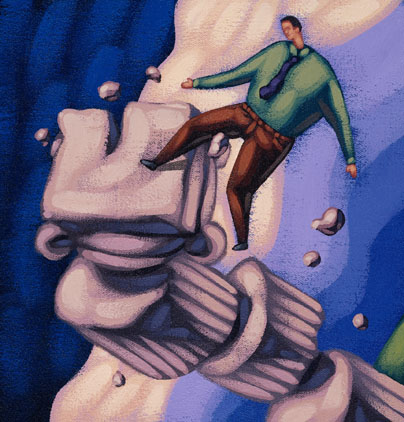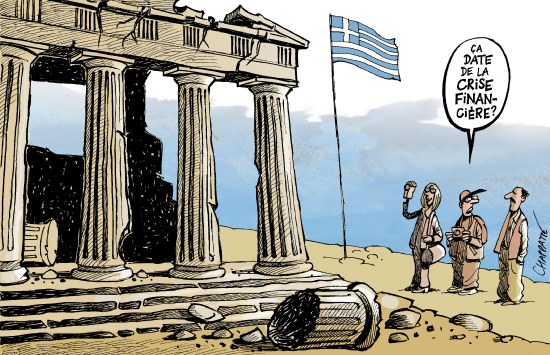
Bankruptcy of Greece or bankruptcy of the Greek state?
They would have us believe that this is the bankruptcy of Greece. Nothing could be further from the truth. It is the bankruptcy of the State in Greece. This is striking proof of the dangerousness of politicians and men of the State. They ruined their country. It’s not the Greeks themselves. These are the men of the State, which includes their so-called “private” accomplices. The men of the State, not content with ruining the Greeks, are today asking them to tighten their belts to repair their stupidities. Is it normal for “the people” to pay for the negligence of their leaders? Certainly, we will easily agree that in a sense he was looking for it. Like the vast majority of Europeans, and especially the French, the Greeks believe in the State. They voted for Men of the State who claimed to guarantee them happiness without effort, without responsibility, without foresight. In short, they had “the State”. And, Bastiat writes in his pamphlet: “The State is the great fiction through which everyone strives to live at the expense of everyone else”. “The people” let themselves be done. But the responsibility for the catastrophe lies primarily with the men of the State. Naivety, even interested credulity, laziness, selfishness are only contributing factors. (…) What to do ? We have to go back to basics. We must restore the individual’s natural rights. The right solution is to liquidate the State as we know it, to refocus it on its basic activities. The Greeks are not bankrupt, their state is. We must privatize. That is to say, returning to people everything that the State has confiscated from them, to restore it to their natural and legitimate owners, the individuals. We must sell all assets not essential to the sovereign functions of the State. The Greeks have the means. It seems that 40% of their GDP comes from the free (“clandestine”, in Newspeak) economy, and that wealthy Greeks invest en masse abroad, in London in particular. (“Objective Liberty” blog, 05/10/2010)

This article (from which we cite extracts here) is symptomatic of the merits and absurdities of liberalism. Because if this ideology rightly insists on the excesses of the state bureaucracy and on the fact that the latter distorts and stifles the economy…it more than simplistically reduces society to a collection of individuals.
We are no longer in the 18th century. Since Bastiat (1801-1850), water has flowed under the bridges. Social sciences have taught us that society unites its members through norms, values, attitudes, a sense of community, morality. The stronger this common spirit, the more the society manages itself through negotiation, network and trust.
In reality, the company manages itself very well in the vast majority of cases. Otherwise, nothing could function on a daily basis, and especially not business life! And it’s not the fear of the police that makes people function. This is simply common sense and morality. Today’s “surveillance society” is based on the exploitation by governments of a tiny proportion of extreme cases of social deviance. Cases which largely result from the policies pursued by these same governments. Extrapolating on these minority cases, the state bureaucracy uses them as a pretext to enact and impose its rules, restrictions and sanctions for its benefit.
In practice, liberalism and neo-liberalism have functioned as ideologies closely linked to the interests of the business bourgeoisie that supports them. This is the reason why they insist on economic freedoms (those of entrepreneurs) more than on social freedoms (those of society) vis-à-vis States, even though the latter are just as important. If her individualistic values are not those of the surrounding society, it doesn’t matter, she promotes and instills such values to the point of dangerously weakening social bonds. The dismantling of social security and any form of protection that this movement has generally promoted is not a miracle solution, and in the short term generates poverty and precariousness. The resulting social and mental disorders are then repressed via police and judicial instruments put in place by the “surveillance society”.
Therefore, if we can subscribe to the idea of an eradication of the State and its refocusing on useful services (not necessarily sovereign functions, because many so-called sovereign functions could be either privatized, societalized or shared) However, we cannot support a simplifying individualist ideology that offers nothing real to replace the decline in state control.
Liberalism and statism are not opposed. In reality. They complement each other: the first, by destroying the social bond, paves the way for the second, because it makes the need for regulations credible; the second has every interest in promoting individualist attitudes which, by making society incapable of regulating itself without the State, will give the impression that it is indispensable.











